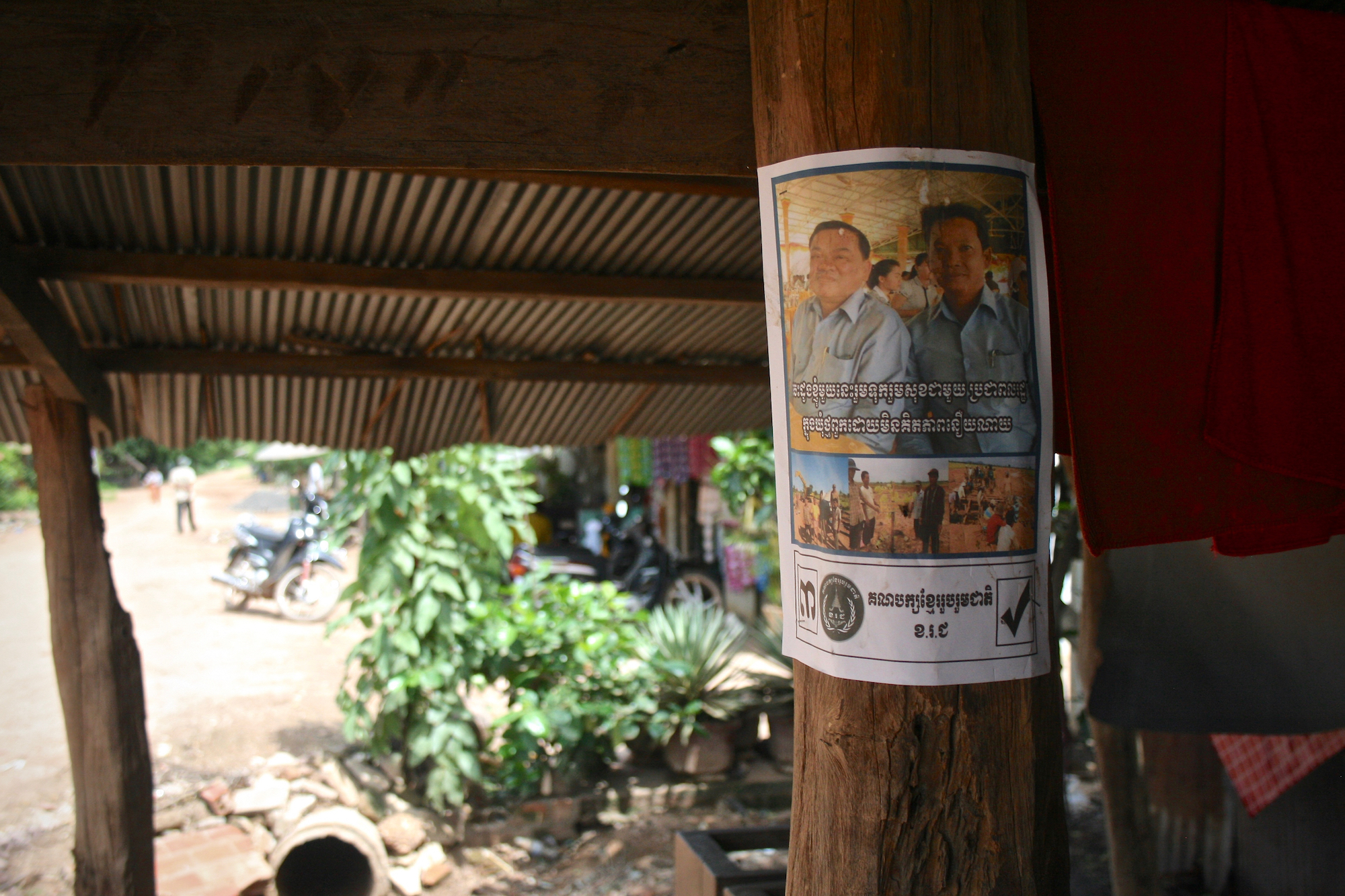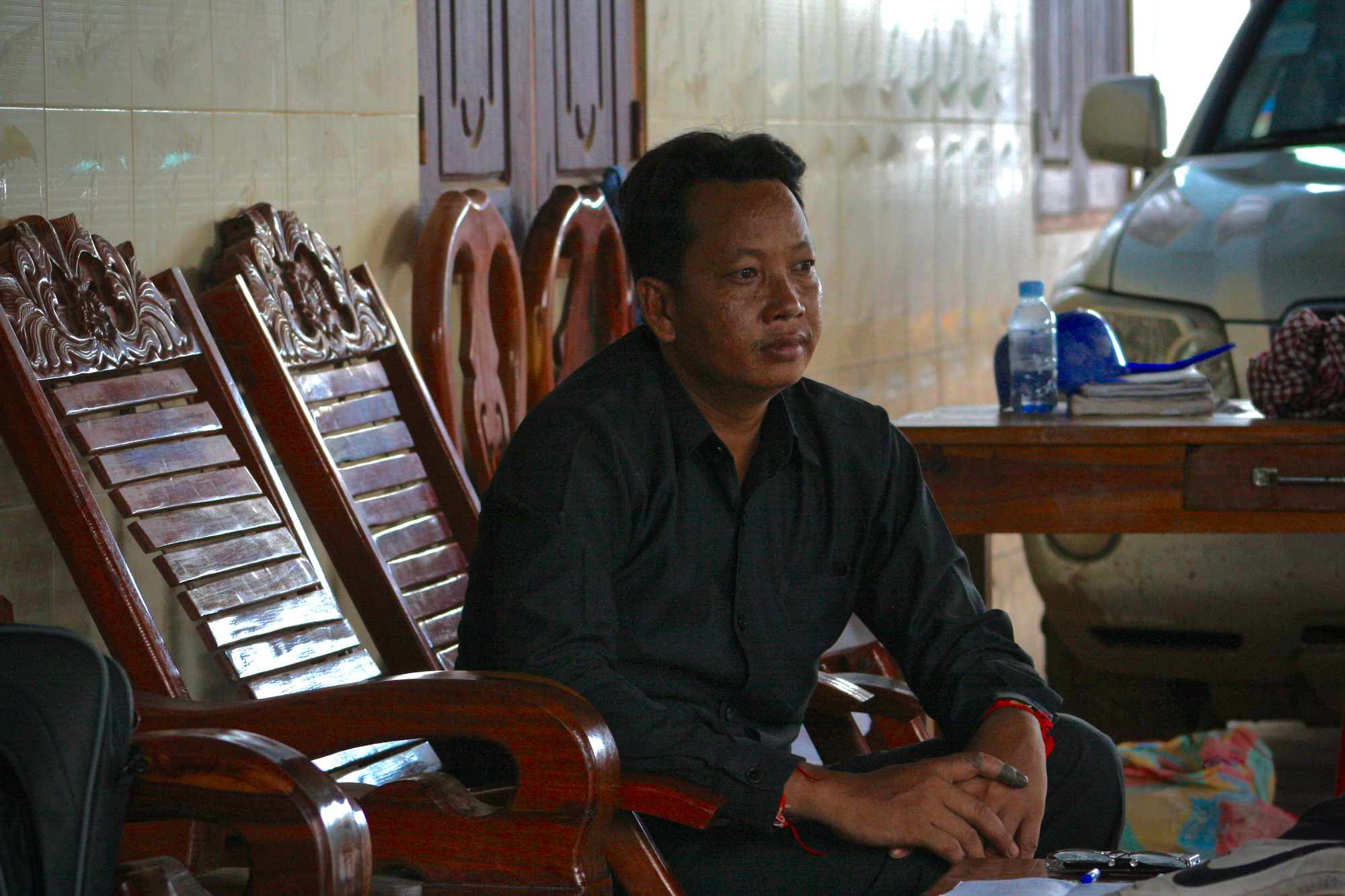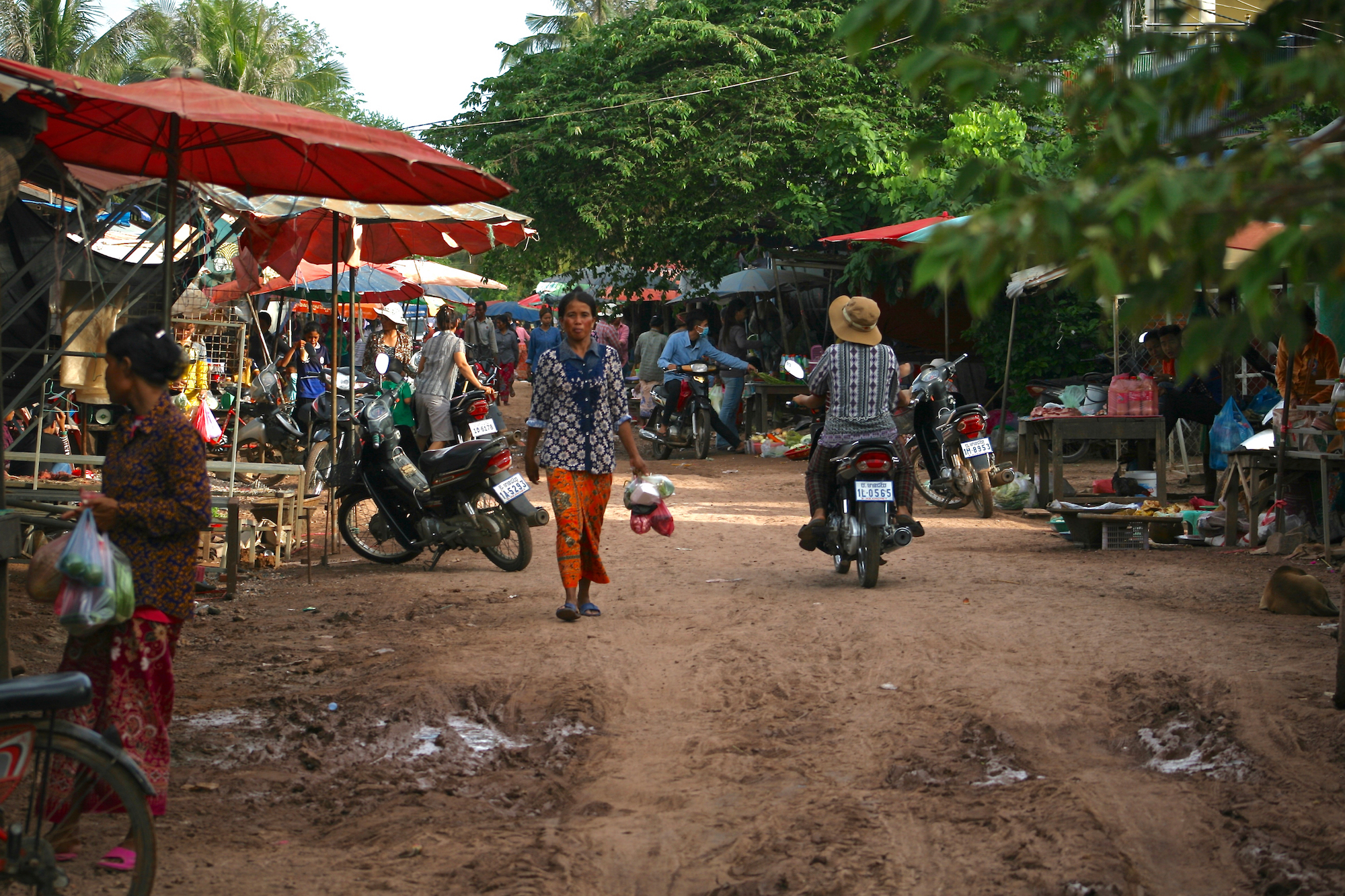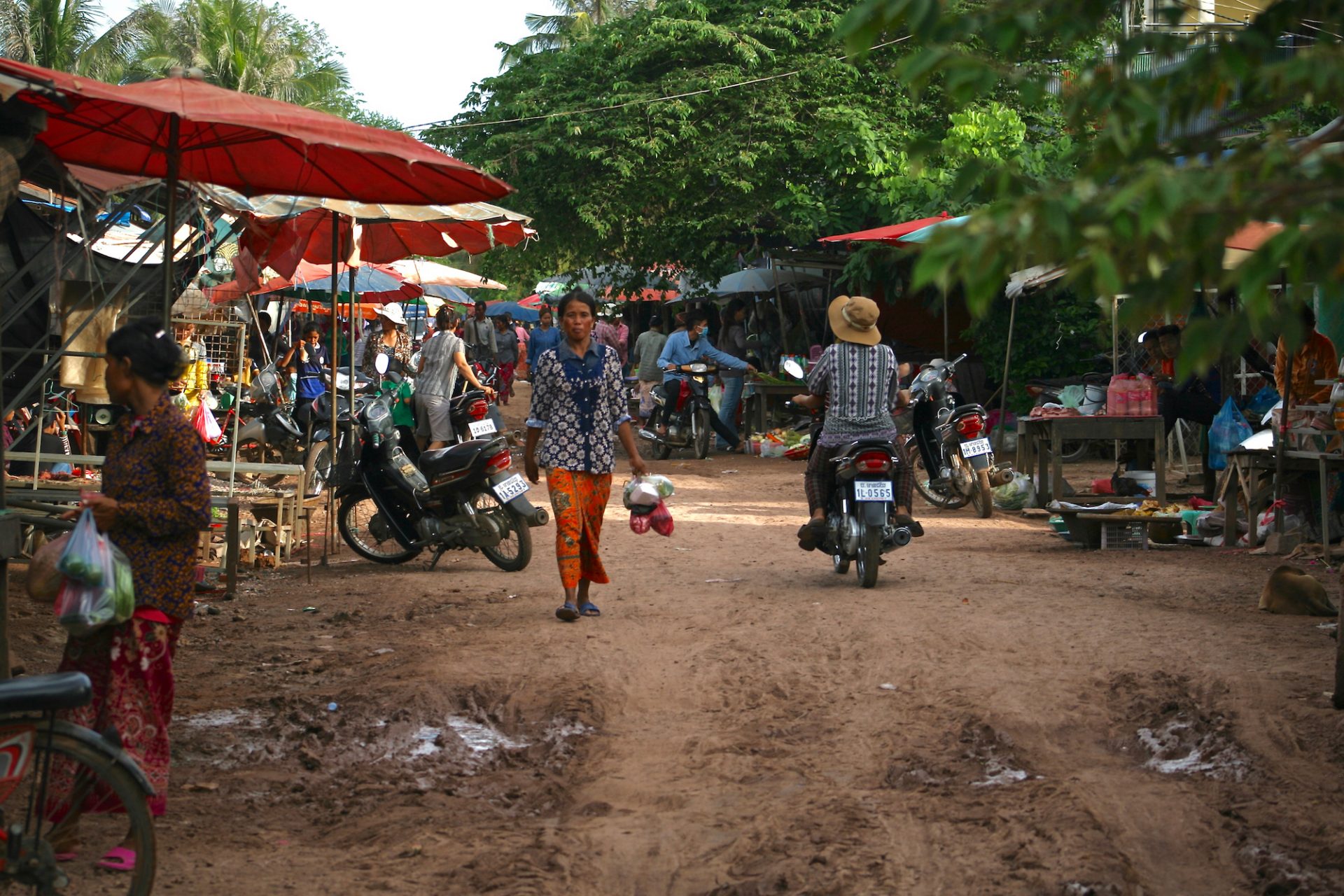
Political Rebels
Only one commune in the elections was won by a minor party. George Wright and Sek Odom visit Thma Puok to find out why it went against the grain.
By George Wright and Sek Odom
June 9, 2017
Thma Puok commune, Banteay Meanchey province – During the 2017 election season in Cambodia, two faces dominated the campaign.
Posters of Prime Minister Hun Sen and opposition leader Kem Sokha were plastered everywhere across the country’s communes. Except in this commune on the Thai border. Here the face of Nhek Bun Chhay ruled.
The former commander of the country’s military under the Funcinpec-led government in the 1990s broke away from the royalists last year to form his own political troop, the Khmer National United Party (KNUP).
When Mr. Bun Chhay left the party of Prince Norodom Ranariddh—after a bitter power struggle—he took hordes of royalists with him. One of those was Funcinpec’s last standing commune chief, Da Chhean, who was elected to lead Thma Puok in 2012.
In Sunday’s commune elections, Mr. Bun Chhay inflicted what could be a death knell to his old foe, as Thma Puok once again elected Mr. Chhean. But this time it was in the colors of KNUP rather than Funcinpec.
It was a coup for the new party in more ways than one.
For the second local election in a row, this remote commune is the only one in the country to vote in a chief from a party that wasn’t the CPP or affiliated with Mr. Sokha and former CNRP leader Sam Rainsy.

A 45-minute drive from the provincial capital, Serei Saophoan, there is little to set Thma Puok apart from any other sleepy Cambodian commune. Laughing children ride bicycles down winding dirt tracks, churning up with mud as the rainy season sets in. Tractors transporting rice and firewood bump along potholed roads. Vendors at the market deal in riel, dollars and Thai baht.
Thma Puok, population 8,228 in the last census, is an unremarkable place all round, which makes it an unlikely location to foster a political rebellion that shunned the country’s two main parties.
Located in the hub of the commune, Da Chhean’s house is considerably larger than the traditional stilted homes surrounding it, with its high brick wall topped with gold-colored ironwork and an electronic gate adorned with a KNUP logo on a dark blue flag. It’s also the only house in sight with a 4×4 vehicle outside.
Exuding a quiet air of confidence, the newly re-elected commune chief is holding court in the grounds of a home he shares with his wife and three daughters. Dressed in black with a smart shirt and trousers, he talks and takes calls on his smartphone.
The index figure of his right hand still bears the ink stain from the election poll.
Mr. Chhean, 47, credits his party’s resounding victory—it received 1,092 votes more than its CPP rival—to a blend of his personal popularity accrued while representing Funcinpec, and the popularity of his leader, about whom he speaks gushingly.
“I only give my trust to His Excellency Nhek Bun Chhay,” Mr. Chhean says. “He’s famous here. I’d say for him and I it’s 50 percent for each other as they love us and give us their trust.”
“I feel in the past five years, because of my will and my honesty, they trust me because I support this community,” he says, citing construction of roads and schools as examples of his successes.

This area nestled on the Thai border is Bun Chhay heartland.
Born in 1956, he grew up in neighboring Svay Chek district. After the overthrow of the Khmer Rouge, he jointly-founded the Moulinaka royalist resistance against the new Vietnamese-backed People’s Republic of Kampuchea. It became a central part of the official armed wing of Funcinpec when it was founded in 1981.
During this period, he served as a sorcerer’s apprentice, he told the South China Morning Post in 2015. At the end of his training he was inked with numerous “magic” tattoos to aid him as a commander, including mantras in Pali—a derivative of Sanskrit—along his jawline to give his voice the power of command, he told the Hong Kong newspaper.
Building a reputation as a fearless commander (legend has it he wore wild boar tusks around his neck in battle for protection), Mr. Bun Chhay was known to demand both fear and respect among his comrades.
When Funcinpec emerged victorious in the 1993 U.N.-backed elections, he was put in charge of the country’s military and was involved in negotiations to secure Khmer Rouge defections. In 1997, however, he fled to O’Smach district, not far from here in Oddar Meanchey province. There he built up forces to battle Mr. Hun Sen, who had just emerged victorious in factional CPP-Funcinpec fighting.
Despite negotiations allowing Funcinpec to continue as a political entity, the party has since disintegrated amid infighting. It was Mr. Bun Chhay who engineered Prince Ranariddh’s ouster in 2006.
Their relationship never recovered. Soon after the prince retook the royalist reigns in 2015, Mr. Bun Chhay left the party to found the KNUP.
At a news conference to announce his new venture at his home in Phnom Penh’s Chroy Changva district in February 2016, he told the assembled broadcast media that he was not satisfied with the “dictatorial” leadership of Funcinpec, among other things.
He also predicted that the loyalty he had built within Funcinpec would allow his new party to have some success in the 2017 commune elections.
“I am like a shop owner, so I have to study the mind of the buyers—what do the buyers want? So I have to produce based on my buyers’ needs. This is my policy,” he said at the time.
While one commune win out of 1,646 may be significant only for the history books, Mr. Bun Chhay has been surprisingly low key about the success. His whereabouts have been unclear in recent days. His telephone has been switched off and a bodyguard at his Phnom Penh home this week said authorities had been “making trouble” at his residence during Sunday’s election.
Spokespeople for the KNUP all had their phones turned off Wednesday and Thursday. Mr. Chhean said he had not heard anything from Mr. Bun Chhay after he called to congratulate him on his victory on Sunday, but believed him to be at home in the capital.
However, in an interview with Radio Free Asia on Wednesday, Mr. Bun Chhay refuted rumors that he was planning to form an alliance with the CNRP.
“People often say this, those who hate me always say it,” he was quoted as saying. “I told Samdech Techo [Hun Sen] that there is no problem.”
Back in Thma Puok, life continues at a leisurely pace.
Lor Muy Kea, 62, is one of 2,261 voters who voted for the policies of the KNUP, which ran a campaign focused on stamping out corruption and combating drug abuse.
The Nhek Bun Chhay factor also played a big part in her choice.
Sitting outside her home, she says Mr. Chhean’s past as a military commander further cemented her decision to vote in his favor. “He works for Nhek Bun Chhay so this is another reason to like him,” she says.
That fact that Mr. Chhean’s father is a doctor and he built new roads for the commune is also part of the appeal.
Her loyalty to Mr. Bun Chhay over Prince Ranariddh also stems from the fact he was born nearby and has always communicated with villagers, she says.
“However, the main reason people like him here is because he fought in the forces controlled by Norodom Sihanouk and he helped people get their lives back to normal,” she adds.
While many of those who voted KNUP on Sunday spoke fondly of Mr. Bun Chhay, most said they voted out of loyalty to Mr. Chhean.
First-time voter Phann Than Sar, 20, says she knew little about the KNUP leader, but had been impressed by what she had heard in Mr. Chhean’s speeches, and was equally underwhelmed by the efforts of the ruling party and the CNRP to attract votes in Thma Puok.
“CPP and CNRP never do much here because we are not loyal to those parties,” she says. “It’s because we like him more than the other two, we prefer his personality.”
Three interviewed CPP voters all said they chose along party lines—even in commune elections—due to Mr. Hun Sen bringing peace, stability and development to the country.
“I vote CPP because our lives until the present time have been under the control of the CPP,” 60-year-old Chhloeng Sun Eng says from inside his barn.
“My understanding is: even if [Mr. Chhean] develops, if we don’t vote for peace, how can the country develop?” he asks.
Inside his home only 100 meters from his electoral rival, CPP candidate Yen Chaop has been left deflated by his heavy loss.
“I thought I would win because some of the villagers supported, me but I lost. There were 2,500 people that I visited and that’s the number I thought I’d get,” Mr. Chaop says, sitting opposite portraits of Mr. Hun Sen and National Assembly president Heng Samrin.
“I don’t know if the villagers just don’t like me or the CPP officials in their village. I’m not sure what’s going on,” he says, adding he’d pumped some of his own money into building roads in the area, so the loss added insult to injury.
Mr. Chaop says he respects Mr. Chhean and gets along well with him, but put his popularity down to the villagers’ naivety of villagers. “I know they are not educated here so it’s easy to encourage them to support him,” he says.
Beng Sar, 46, who took over Mr. Chhean’s role as Funcinpec’s candidate and received only about 100 votes on Sunday, was less diplomatic.
“I feel unhappy that the KNUP won because they use the way of offering gifts or money to the villagers. Before the election, they always held parties,” he says. “In my opinion, Da Chhean has been good for the last five years but he’s now cheating villagers after he left Funcinpec and joined the KNUP.”
“I think he left from Funcinpec because he got much more money from the KNUP. Nhek Bun Chhay was a famous person during the war but now he’s not really famous so he uses money to make the party more attractive.”
At his home, Mr. Chhean rebuts Mr. Sar’s accusation that he was cheating voters by handing out gifts and throwing parties.
“To offer donations to villagers is normal. It’s the same as the CPP, they always do that, he says. “Sometimes we have a small party with villagers when we discuss the strategy for the party. You should understand, in the remote areas with villagers, it’s normal to have a little white wine.”
The commune chief, who can be seen alongside Mr. Bun Chhay in photos stuck to nearby trees and houses, says that he believed his former party’s days were numbered.
“It will finish soon, this party. It’s old and the party is just run as a business,” he says.
Despite his adoration for the KNUP leader and the pride of his personal success in local elections, Mr. Chhean admits that he was less confident of his constituents going against the grain in next year’s national election.
“The CNRP are popular because of the party, and the CPP just don’t have popular candidates here,” he says. “I think that they might vote CPP in the national election.”




